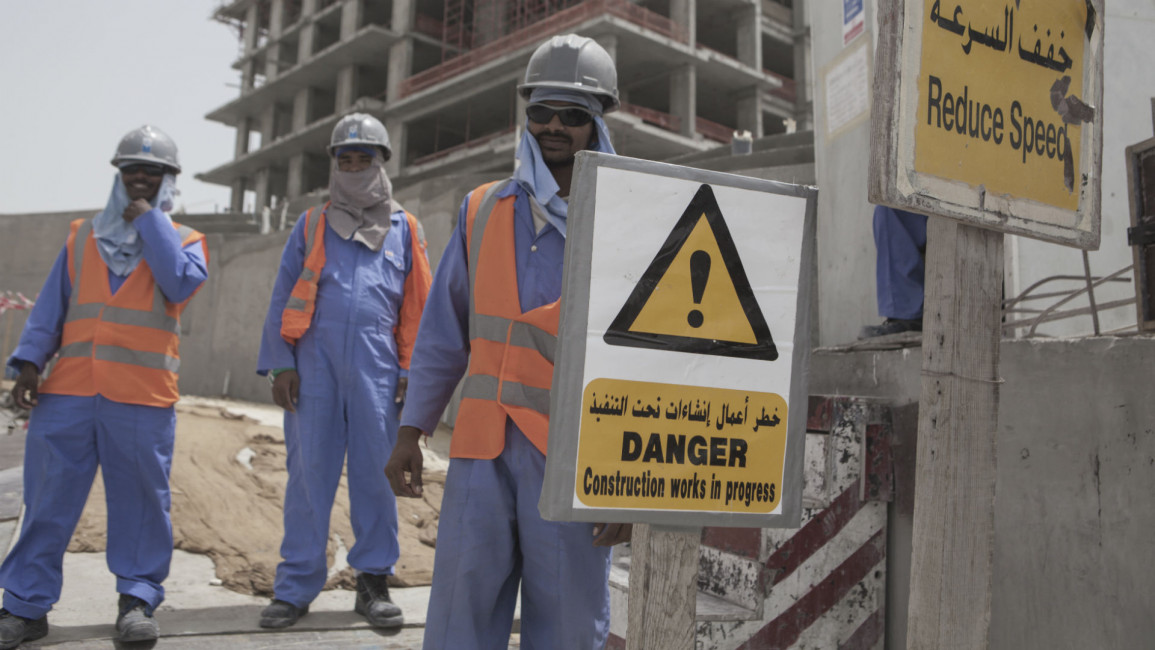Qatar vows investigation into allegations of 'serious' violations of migrant workers' rights
The director of the Qatari government liaison office said the Gulf state would hold officials responsible for breaking the law accountable.
Qatar “is committed to the changes we have made to our labour laws, Saif al-Thani said on Twitter, stressing in another tweet directed at executive director of Human, Sarah Leah Watson that an investigation would take place.
The comments came after a HRW report published earlier this month said hundreds of migrant workers in Qatar staged strikes to protest against what they described as poor working conditions and threats of pay cuts.
Although some labour reforms have been implemented over the past year, the Qatari authorities have not repealed what the rights organisation has called an “exploitative sponsorship system” which fuels abuses and gives employers excessive authority over workers.
Qatari law still prohibits migrant workers from joining unions or participating in strikes but a labour worker quoted in the HRW report said he and his colleagues were allowed to continue their protest until midnight. Five police vehicles, three of them riot police vehicles, arrived on site over three hours after workers had started congregating, but the unnamed migrant worker said they did not try to disperse the protesters. Human Rights Watch reviewed a video corroborating this information.
|
||
He also said that Qatari men he suspected were high-level labour ministry officials arrived on the scene. “They came to calm people down, saying to us they will find solutions,” he said.
Read more: Why Qatar should lead Gulf states in abolising the Kafala system for migrant labourers
HRW accused Qatar of subjecting migrant workers to “an exploitative labour system that puts them at risk of forced labour, besieging them in conditions of work that threaten their rights to fair wages, overtime, adequate housing, freedom of movement and access to justice.”
Human Rights Watch said what it called "serious and systematic violations of migrant workers rights in Qatar usually stem from the still-canceled sponsorship system, which links migrant workers' visas to their employers and severely restricts their ability to change employers.”
“The workers in Qatar are going on strike in a country that bans them from striking or joining unions, and against the backdrop of a labour system that leaves them vulnerable to abuse and exploitation,” said Lama Fakih, acting Middle East director at Human Rights Watch. “Abusive labour practices that lead workers to take such a risk will continue until the Qatari government makes good on its promise to repeal the kafala system.”
Qatar committed to reform its laws and practices to meet international labour standards in October 2017, vowing to improve conditions for thousands of migrant workers in the tiny Gulf state since its selection as the 2022 World Cup host.
Among the reforms are setting a temporary minimum wage, introducing a law for domestic workers, setting up new dispute resolution committees, mandating the establishment of joint labour committees at companies employing more than 30 workers for collective bargaining, establishing a workers’ support and insurance fund, and ending the requirement for most workers to get an exit permit through their employer to leave the country.
In February, Qatar said it was committed to labour reform following an Amnesty International report that the 2022 World Cup host was failing to stop widespread labour abuse.
Doha said it was on course to deliver "lasting" change after the human rights group accused the energy-rich state of "running out of time" to implement reforms before the World Cup.
Follow us on Twitter: @The_NewArab



